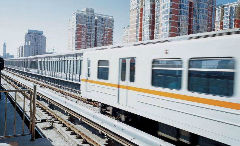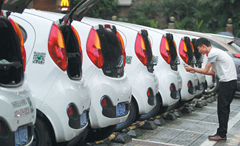China driving smart traffic development
2018-06-13
China Daily
Major Chinese cities are ranked among the world’s mobility leaders thanks to their use of technology to drive the development of smart traffic, according to a recent report.
Shenzhen is the best-performing city in China, ahead of Shanghai, Beijing and Hong Kong, when it comes to the deployment of intelligent traffic lights, grids and shared traffic, global consultancy Deloitte LLP said on June 12.
The research investigated traffic conditions in 54 cities with economic and political influence globally - such as New York, London, Tokyo and Dubai - gauging 15 metrics including air quality, regulatory environment, congestion levels, public transport supply and versatility.
“The four Chinese cities score well in many areas such as investment, regulation, versatility and affordability. But in congestion and air quality their rankings are lower,” said Simon Dixon, partner and global transportation leader at Deloitte.
According to the report, Shenzhen in Guangdong province is using artificial intelligence and big data to improve road safety, communications and peer efficiency - such as leveraging technologies to identify images of traffic violators with 95 percent accuracy.
It also pilots a real-time, data-backed parking management system, aiming to take 330,000 vehicles off the road each day in a bid to mitigate congestion.
Other best practices include subsidizing charging infrastructure to accelerate electric vehicle adoption, the report said. The city’s electric bus fleet will have more than 16,000 battery-powered buses in operation.
Shanghai’s strength lies in the expansion of transportation infrastructure that connects with neighboring cities such as Kunshan and Suzhou in Jiangsu province, while Beijing stands out for its encouragement of electric vehicle ownership and ride-hailing, the report noted.
In comparison, Hong Kong is lagging behind its mainland counterparts in the testing and adoption of new technologies - such as ride sharing and autonomous vehicles - putting its position as a future mobility leader in peril.
While not included in the report, best practices in smart transportation from other Chinese cities such as Hangzhou, Zhejiang province, and Suzhou stood out among their global peers, said Clare Ma, a Deloitte partner specializing in smart city research.
For instance, Alibaba Group has helped local authorities in a number of Chinese cities to use massive computing power and data-processing capabilities to optimize traffic flows and deliver emergency responses. The company has even extended such capabilities to overseas cities such as Kuala Lumpur in Malaysia.


